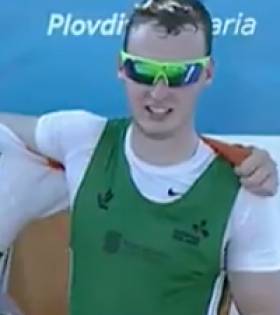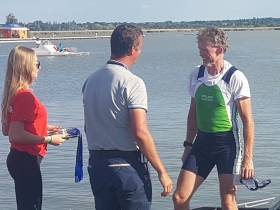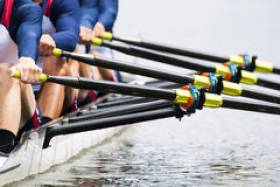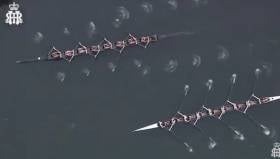Displaying items by tag: commercial
Due to the weather forecast, both the Neptune and Commercial rowing regattas in Dublin have been cancelled. The organisers have cited strong winds of 45k/hr and gusts of 90k/ph expected to hit Islandbridge as the cause.
St Joseph's Shine at Head of the Shannon
St Joseph's of Galway were the fastest crew in the shortened second head at the Head of the Shannon rowing event in Carrick on Shannon today. The men's junior 18A eight rowed well and set a provisional time of nine minutes 19.3 seconds.
Commercial's men's junior 18A quadruple were almost as fast, winning their class in nine minutes 22.6 seconds.
The fastest women's crew was the Commercial club one eight, while the Tribesmen/Athlone combination came home fastest of the mixed masters eights.
Brian Colsh of Sligo came home fastest of the junior men's single scullers; Molly Curry was the best women's junior single sculler.
The conditions were surprisingly good, with the water calmer as the afternoon went on.
Beggan Best at Dublin Sculling Ladder Time Trial
#Rowing: Niall Beggan of Commercial won the time trial for the Dublin Sculling Ladder at Islandbridge today. His time of six minutes 53.87 seconds was over two seconds clear of his Commercial clubman, Mikey Campion, who was second. Beggan had also won in 2017. The fastest woman was Aoife Moloney, also of Commercial, with Neptune’s Claire Feerick second.
Crowley Leads Ireland to More Masters Wins in Hungary
#Rowing: Irish crews added four more wins to their haul over the weekend at the World Masters Regatta at Lake Velence in Hungary. The wins came on Saturday. Denis Crowley featured in a composite eight, which beat strong British opposition, and in a four – bringing his personal tally to eight wins. Brendan Smyth and Patrick Fowler of Commercial won in the double and Milo and Pat Murray of Cappoquin won the in the pair. A mixed eight finished second on Sunday.
World Masters Regatta, Lake Velence, Hungary (Selected Results; Irish interest; Winners)
Saturday
Men
Eight (E – avg 55 or more): Galway, Belfast BC, Neptune, Clonmel, Commercial, Shannon (G Murphy, A McCallion, K McDonald, D Crowley, F O’Toole, O McGrath, G O’Neill, C Hunter, M McGlynn) 3:04.90
Four (D – avg 50 or more): Commercial, Neptune (B Smyth, F O’Toole, G Murphy, D Crowley) 3:24.72.
Pair (F – avg 60 or more): Cappoquin (P Murray, M Murray) 6:12.10.
Sculling, Double (C – avg 43 or more): Commercial (B Smyth, F Fowler) 3:28.39.
Crowley a Six Shooter at World Masters Regatta
#Rowing: Denis Crowley of Commercial brought his tally of wins to a remarkable six after three days at the World Masters Regatta in Budapest. In just one day, the 57-year-old won in the coxless four and twice in the single sculls – in the C class (43 years or more) and the E class for 55 or more. The decision to form composite crews again paid off for the Irish, with wins in the C eight and the D coxed four, along with Crowley’s haul.
World Masters Regatta, Budapest, (Selected Results, Irish interest, winners)
Friday
Men
Eight
(C – 43 or more): Heat Four: Commercial, Cork, Neptune, Clonmel, Shannon, Galway, Castleconnell (B Crean, B Smyth, R Carroll, O McGrath, G O’Neill, P Fowler, B O’Shaughnessy, K McDonald; cox: M McGlynn) 3:09.75.
Four
(E – 55 or more) Heat Five: Commercial, Neptune, Belfast BC, Galway (D Crowley, G Murphy, C Hunter, A McCallion)
Four, coxed
(D – 50 or more) Heat 3: Galway, Neptune, Castleconnell, Clonmel (G O’Neill, O McGrath, B O’Shaughnessy, T Dunn; cox: M McGlynn) 3:35.89.
Sculling, Single
(C - 43 or more) Heat 19: Commercial (D Crowley) 3:49.92.
(E – 55 or more) Heat 8: Commercial (Crowley)
Irish Composite Crews Lead the Way at World Masters
#Rowing: A composite of five crews – Galway, Neptune, Commercial, Clonmel and Cork – won in the men’s eight for 50 and over at the World Masters Regatta in Budapest. It was one of a sequence of wins for the Irish at the huge event.
Brendan Smyth and Patrick Fowler, rowing for Commercial, won the Pair in the A class, while Denis Crowley and Tony Corcoran won in single sculls.
Two C fours (43 or more) won and an E coxed four (55 or more) also took the honours.
World Masters Regatta, Budapest, (Selected Results, Irish interest, winners)
Wednesday
Men
Four, coxed E (55 or more) – Heat Four: 1 Belfast BC, Commercial, Galway, Leichhardt RC (C Hunter, A McCallion, M Heavey, G Canning; cox: JM Marks) 8:05.40
Thursday
Men
Eight (D – 50 or more) – Heat Two: Galway, Neptune, Commercial, Clonmel, Cork (B Crean, B Smyth, R Caroll, O McGrath, G O’Neill, P Fowler, D Crowley, G Murphy; cox: M McGlynn) 3:05.06.
Four (C – 43 or more): Heat Three: Commercial, Galway, Clonmel, Neptune (R Carroll, O McGrath, P Fowler, G O’Neill) 3:15.28. Heat Six: Commercial/Neptune (D Smyth, F O’Toole, G Murphy, D Crowley) 3:15.54.
Pair (A – 27 or more): Heat Three: Commercial (P Fowler, B Smyth) 3:32.68
Sculling, Single – (D – 50 or more) – Heat 15: Commercial (D Crowley) 3:55.15.
(H – 70 or more) – Heat Eight: 1 T Corcoran 4:27.08.
#Rowing: UCD won only their second senior men's eights Championship of Ireland since 1973 at the National Rowing Centre today. They last won in 2011. They had a clearwater lead by half way and never let it go.
The senior women's eight saw NUIG/Castleconnell also win well. The stern pair of Sadhbh O'Connor and Fiona Murtagh were taking their fourth titles of the weekend.
The final session of the Irish Championships started with a UCD win in the men's novice eight and continued with Ruth Morris of Commercial moving well clear to win the women's intermediate sngle sculls.
Colaiste Iognaid won a battle with Commercial in the men's junior pair, while Lee's junior women matched their junior men by winning the quadruple.
The final race of the whole event, the men's intermediate double, was won by Skibbereen.
Cork Clubs on a Run at Irish Championships
#Rowing: Cork clubs had a set of good results in the first session of Sunday finals at the Irish Rowing Championships at the National Rowing Centre.
Cork Boat Club's junior women's pair started the ball rolling, while Skibbereen then took their second title of Championships as Aodhan Burns proved a strong winner of the lightweight single sculls.
Margaret Cremen of UCC had a huge win in the lightweight single sculls, and Lee added the junior men's double to the junior quadruple title they had won on Saturday.
The tighest finish came in the men's club coxed four. NUIG made a tremendous effort to catch St Michael's of Limerick but they fell short by just .329 of a second.
Commercial of Dublin and Fermanagh's Enniskillen Royal Boat Club are having a good reatta. Enniskillen won the men's intermediate pair, while Commercial won the womens intermediate coxed four.
Davis Of Lee Valley the Irish Junior Champion at Fourteen
#Rowing: Holly Davis gave the crowds a sensational result at the Irish Championships. The Lee Valley girl came through a good battle with Eabha Benson of St Michael's, to pull away and win. The remarkable thing is that Davis is just 14. She does not turn 15 until January 10th next year, leaving her with four years at Junior level.
The men's junior coxed four also electrified the crowd: Colaiste Iognaid and Enniskillen duked it out down the course. The Galway crew got away to win as their emotional supporters roared them on.
Youth was the theme of this regatta: Kevin O'Donovan, who is a junior, won the club single, while Anna Tyther, also under 18 teamed up with Zoe Hyde to win the intermediate double for Killorglin.
The three other titles on offer in this first Saturday session went three different ways: Commercial's strong senior men's programme was on show as they won the men's quadruple; Cork had a fine win in the intermediate men's eight; Trinity's A crew won the women's novice eight.
#Rowing: Commercial gave a good account of themselves but were beaten by half a length in the semi-final of the Thames Cup at Henley Royal Regatta.
Thames are the defending champions and masters of this event, and they controlled this race. They took a lead which never stretched beyond a length. However, they anticipated the Commercial attacks and countered them. Coming up to the line, the Dublin club closed right up – but Thames held firm to win.
Henley Royal Regatta, Day Four (Selected Results; Irish interest)
Thames (Men’s Eight, Club): Thames bt Commercial ½ l
Silver Goblets (Men’s Pairs, Open): A Diaz and A Haack bt M O’Donovan and S O’Driscoll (Skibbereen) 2¾ l
Visitors (Men’s Four, Club and University): Cambridge University and Leander Club bt UCD 1¾ l




























































